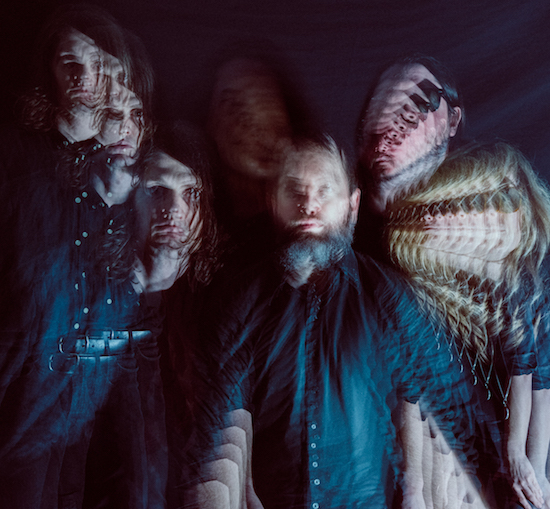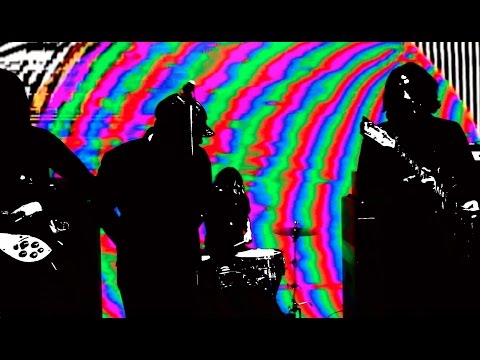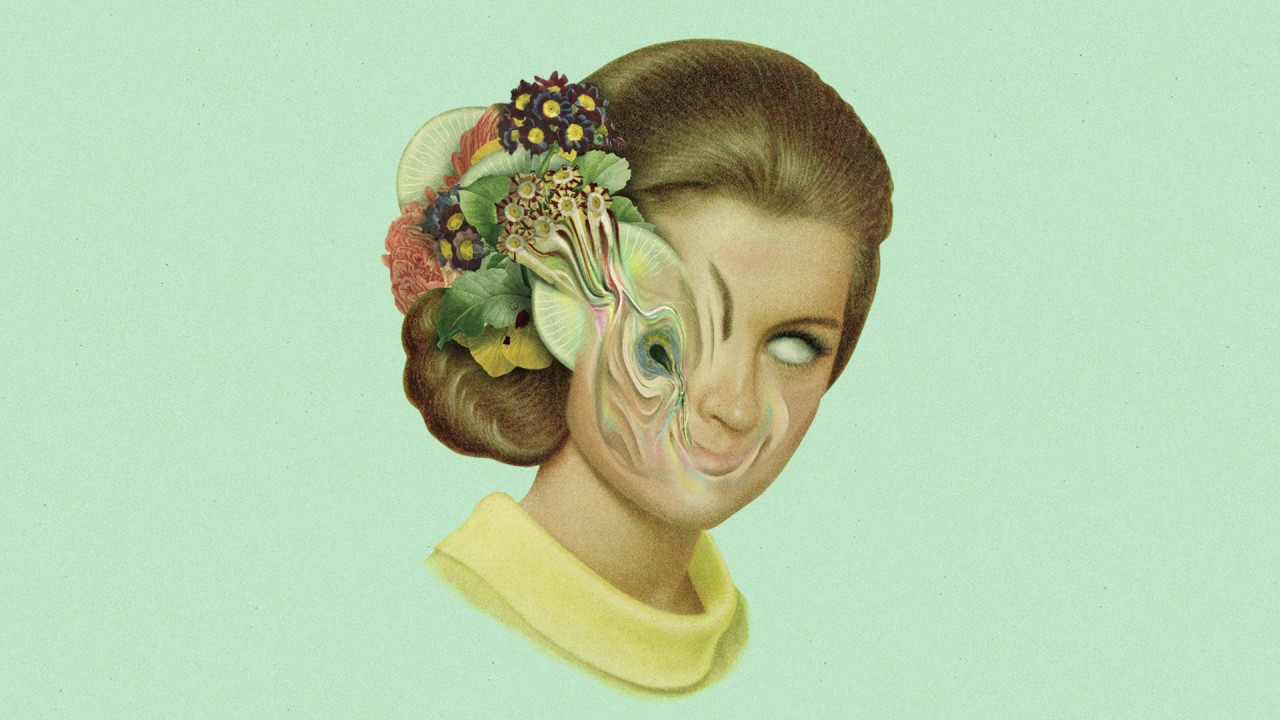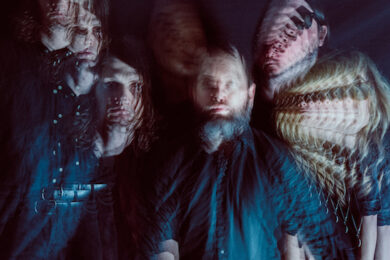Probably the most common criticism levelled at psychedelic music is that it’s pure escapism, with nothing to say. While it’s difficult to deny that there are plenty of bands labouring under the misapprehension that a phalanx of effects pedals and a decent lighting technician makes for psychedelia, there remains o good supply of genuine cosmic voyagers exploring alternate states of consciousness and reality, and reporting back on them via their music.
Included in that latter number are The Black Angels. Hailing from Austin, Texas – the home of psychedelic pioneers The 13th Floor Elevators – the band, while being very much the descendants and disciples of Roky Erikson’s ill-fated crew, have been forging a distinct variant of the form of their own since arriving with the first album, Passover in 2006. As true evangelists, The Black Angels were instrumental in setting up the Austin Psych Fest – later renamed Levitation – and its reverberations are felt to this day in the psychedelic festivals springing up all around the world.
After a four-year absence, they’re now back with their fifth album, Death Song. Their strongest collection to date, it’s also one that takes aim at psychedelia’s naysayers. The opening track, ‘Currency’, hits out at the malaise of late-period capitalism (“One day this will all be over / One day you will all be gone”) and sets the tone for the rest of the album. ‘Comanche Moon’ views life from the perspective of Native Americans – made all the more pertinent under the shadow of the Dakota access pipeline protests – while ‘I’d Kill For Her’ is a cunningly deployed attack on blind patriotism.
Musically, it’s stunning. There are more riffs, more reverb, more power, just … more Black Angels. But there are moves into other areas, such as the spectral closer ‘Life Song’, one of the most affecting and haunting songs they’ve recorded, that prove that The Black Angels have so many more areas to mine. With this in mind, tQ spoke to guitarist Christian Bland to a get a better handle on where they’re coming from and where they’re headed to next…
Where have you been for the last four years?
Christian Bland: We’ve been writing a lot and every now and then we’d do a one-off show. For the most part we’ve been here writing a lot. We get together each week for a few hours at our practice space and play together. That’s kind of how this album came about. Some of these songs we’ve had since 2014 and they’ve marinated a long time.
So presumably the music evolved over four-year period?
CB: Exactly. That’s a good thing because, sometimes when you rush into an album, you don’t give the songs enough time to metamorphosise into what they potentially can be. This time round we were conscious of allowing them time to do that. A lot of the time we took the new songs on the road and over time they changed. By the time you get into the studio you have to halt that changing process but this time round, by the time we got into the studio, the songs were ready to be documented. We [wrote] about 40 songs over that four-year period and we ended up choosing our favourite ones and the ones we felt were furthest along. We’ve already got another ten or so songs set to go, so we might well have a follow-up coming around shortly. You won’t be waiting so long for the next album!
With regard to the album title, why have you waited this long to make a Velvet Underground pun, or was there something deeper on your mind?
CB: There’s something deeper. Funnily enough, I’d never though of doing that title until maybe the last year or so. For a while, the album was going to be called Parakuja, which are auditory hallucinations. There was something about that title that I didn’t really like, and everybody else in the band wasn’t too stuck on it either, but that was kind of the working title. When I was designing the album cover, I was putting in the name of our publishing company, which is called Death Song Publishing Company, so we’ve always had that pun, but this time around I thought, that’ll make an interesting album title. So I took that to the band and they said, “How about dropping off the ‘publishing company’ bit?” and I thought, sure, that’s perfect.
It works in reference to the songs on the album, and it is a nod to The Velvet Underground. But also, this is an album of 11 songs of our observations on life over the last four years. We’ve always had a protest angle to our music but it’s come out a little more directly in this one. The last album, Indigo Meadow, was kind of like a surreal journey but this time around I think we were a lot more thoughtful and direct in as far as our observations were concerned.
We’re now living in times when phrases like ‘the nuclear option’ are bandied around freely in the White House and the largest non-atomic bomb of all time has just been dropped on Afghanistan. What role does psychedelic music have to play in times like these?
CB: We’re here to open people’s minds and expose what’s going on. We’re observing what’s going on and presenting it so hopefully people can make their own decisions about the topics. We wanna be like eyes and ears for people so they can, like The 13th Floor Elevators – who are one of our biggest inspirations – said, open up their minds and let everything come through. And from the very beginning of the band, we do view that as an artistic responsibility.
You guys have never been shy about addressing these topics. Is it time for others to do so, too? Will we ever see a time again were politics, culture, art and music and all intertwined?
CB: I hope so. The bottom line is that music is entertainment but if we can express a message that we believe in, then that’s what we’re gonna do. The world works cyclically and it seems that things have rolled back to how things were in the 60s and things are getting crazy in the world right now.
There seems to be a resurgent interest in psychedelics outside of the usual circles. Micro-dosing is becoming a thing and psychological researchers are turning their interest back towards LSD. Why do you think there is this interest?
CB: I think that people are seeing the world how it is right now and are perhaps looking for a change, and psychedelics are perfect for that; they open up your mind. I think that psychedelics, if used properly, are the greatest thing in the world; they help you understand things that previously you might not have been able to understand. They help you see the world differently and could help change your point of view.
Are we crying out for a new psychedelic age?
CB: A lot of states in the US are decriminalising pot but probably more for financial reasons than anything else, but I think people are crying out for a greater understanding of why they’re here on this planet and trying to figure out what’s going on, because things are spiralling out of control. It’s a way of unlocking doors that perhaps people didn’t even know are there and maybe offer an alternative to what they’re doing with their lives.
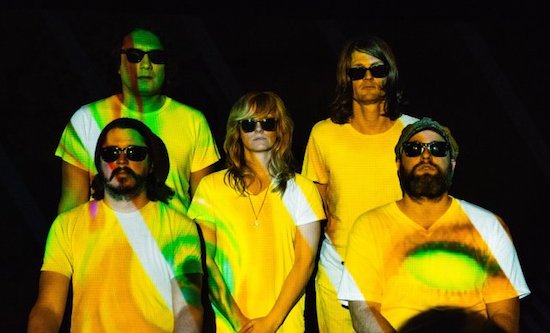
You were instrumental in setting up the Austin Psych Festival – now called Levitation – and you’re headlining this year’s Liverpool International Festival of Psychedelia. There are psych festivals springing up everywhere now. Do you feel like a proud parent?
CB: I do! I think that’s awesome that it’s happening, and it’s a testament to psychedelic culture. People are wanting to get involved and are setting these things up and the more the better. I’ve been to the ones in Liverpool and Vancouver.
Isn’t there a worry of bandwagon-jumping from any old band with effects pedals that go ‘whooosh!’
CB: With every movement, things always start to get commercialised and it starts to dilute itself. For our part, we stay true to ourselves by letting the music channel through us. There’s never a time when I sit down to specifically write something. Instead, the mood just strikes me when I get overwhelmed to create something. Running things organically is what works for us and forcing things through is never a good option. Once you expose yourself to a crowd by standing on stage, an audience can tell whether you’re being truthful or not. I can tell if a band is real by whether they suck me in or not. They won’t do if they’re a bunch of posers. Also, I think that the cream always rises to the top.
Did the use of ‘Young Dead Men’ on True Detective have any effect on the band?
CB: It seems to have done. I’ve had lots of people come up to me saying, “Man! I heard your music on True Detective!” It helped to turn a lot of new people on to our music.
Would writing a whole soundtrack appeal to you?
CB: Oh, absolutely! I’d love to! When we first started the band, we’d play along to movies. You know, we’d put on something like Apocalypse Now! and start creating to the visuals of the movie. We worked on a TV show – I forget what it was called but it was about legalising weed in Colorado and it was on the Discovery Channel – but we scored that show. It was a really interesting process. The producers would send us some footage and say something like, "Now give us something sinister for this," and they really dug it. We enjoyed ourselves too. We had this other opportunity to score Grand Theft Auto V. We were scoring for one of the characters and that was a really hard process. Scoring for a video game is way different from scoring a television show and it became very frustrating and it didn’t come to fruition. But there was also a moral dilemma connected with that. That was around the time we were putting out Indigo Meadow and we had a song called ‘Don’t Play With Guns’ and Grand Theft was glorifying that so there was a definite conflict of interest there. In the end, it all faded out.
Do you notice any differences between European and American psych audiences?
CB: I think Europeans are more excited so see us. Which is great for us, after all the distances we have to travel. In Austin, there doesn’t seem to be quite the same levels of excitement. Maybe it’s because it’s like, “Oh, here they are in Austin again; maybe we’ll just see them again next time.”
What was the last thing you learned?
CB: Alex [Maas, singer/bassist] has taught me to be more open-minded, even though that’s what the band is striving to do. Sometimes you can lose that on your day-to-day activities an Alex helps me reflect on that. And it helps with the music sometimes. I can be very particular about the music. Take ‘Half Believing’ on the album. That’s very different to what we’ve done before, and there was a debate as to whether that would be on the album or not because we had so many other songs. I wasn’t sure that it would fit but Alex explained how he saw it, and it fits in with the rollercoaster of the record. It’s a very hard, heart-attack kind of album and we needed some release and it works. So yeah, Alex has taught me how to be more open-minded with the music.
The Black Angels headline Liverpool Psych Fest this September before touring the UK – for information go here. Death Song is out now

